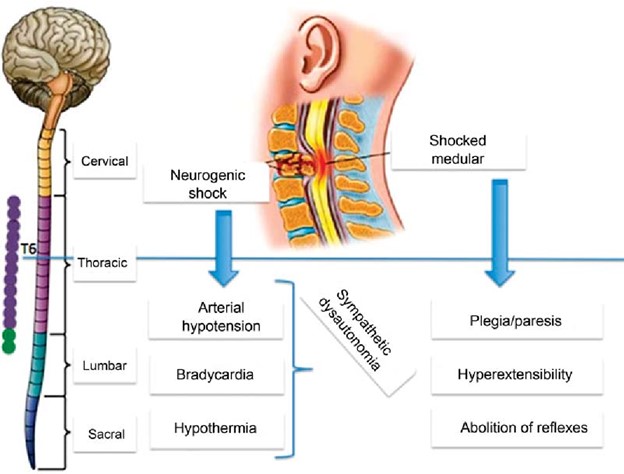A client arrives to the emergency department after falling from a ladder. The client has a loss of sensation and flaccid paralysis. Which of the following complications of an acute spinal cord injury does the nurse suspect?
Hemorrhage
Spinal shock
Apoptosis
Neurogenic shock
The Correct Answer is B
Choice A Reason: Hemorrhage is not a complication of an acute spinal cord injury, but rather a possible cause of it. Hemorrhage can occur due to trauma or rupture of blood vessels in or around the spinal cord, leading to compression and damage of the nerve tissue.
Choice B Reason: This is the correct choice. Spinal shock is a complication of an acute spinal cord injury that occurs within minutes to hours after the injury. It is characterized by loss of sensation, motor function, reflexes, and autonomic function below the level of injury. It is caused by transient disruption of nerve conduction and synaptic transmission in the spinal cord.
Choice C Reason: Apoptosis is not a complication of an acute spinal cord injury, but rather a cellular process that occurs after it. Apoptosis is programmed cell death that occurs in response to injury or stress. It can lead to further loss of neurons and glial cells in the spinal cord over time.
Choice D Reason: Neurogenic shock is a complication of an acute spinal cord injury that occurs within hours to days after the injury. It is characterized by hypotension, bradycardia, and peripheral vasodilation due to loss of sympathetic tone and unopposed parasympathetic activity. It is caused by disruption of autonomic pathways in the spinal cord.

Nursing Test Bank
Naxlex Comprehensive Predictor Exams
Related Questions
Correct Answer is A
Explanation
Choice A reason: This is the correct answer because this describes a stupor, which is a state of near-unconsciousness or reduced responsiveness. A stuporous client shows minimal movement and verbal responses and requires extreme vigorous stimulation such as painful stimuli to awaken briefly.
Choice B reason: This is incorrect because this describes obtundation, which is a state of reduced alertness or awareness. An obtunded client is extremely drowsy and minimally responsive and requires vigorous stimulation such as shaking or shouting to wake.
Choice C reason: This is incorrect because this describes lethargy, which is a state of decreased energy or activity. A lethargic client is alert and oriented x3 (to person, place, and time), but sluggish and drowsy, and wakes to voice or gentle shaking.
Choice D reason: This is incorrect because this describes a coma, which is a state of deep unconsciousness or unresponsiveness. A comatose client does not respond to verbal stimuli or speak and shows abnormal posturing in response to pain, such as decorticate (flexion of arms and extension of legs) or decerebrate (extension of arms and legs).
Correct Answer is ["A","B","C","D"]
Explanation
Choice A Reason: A distended bladder is one of the most common triggers of autonomic dysreflexia, which is a life-threatening condition that occurs in clients with spinal cord injuries above T-6. The bladder becomes overfilled and stimulates the sympathetic nervous system, causing vasoconstriction and hypertension.
Choice B Reason: A severe headache is one of the most common symptoms of autonomic dysreflexia, caused by the increased blood pressure in the brain. The headache may be accompanied by blurred vision, sweating, flushing, or anxiety.
Choice C Reason: An elevated blood pressure is the hallmark sign of autonomic dysreflexia, which can reach dangerously high levels and cause stroke, seizure, or death. The blood pressure may rise up to 300/160 mmHg or higher.
Choice D Reason: Nasal congestion is another possible trigger of autonomic dysreflexia, as it stimulates the nasal mucosa and activates the sympathetic nervous system. Other potential triggers include bowel impaction, skin irritation, tight clothing, or temperature changes.
Whether you are a student looking to ace your exams or a practicing nurse seeking to enhance your expertise , our nursing education contents will empower you with the confidence and competence to make a difference in the lives of patients and become a respected leader in the healthcare field.
Visit Naxlex, invest in your future and unlock endless possibilities with our unparalleled nursing education contents today
Report Wrong Answer on the Current Question
Do you disagree with the answer? If yes, what is your expected answer? Explain.
Kindly be descriptive with the issue you are facing.
